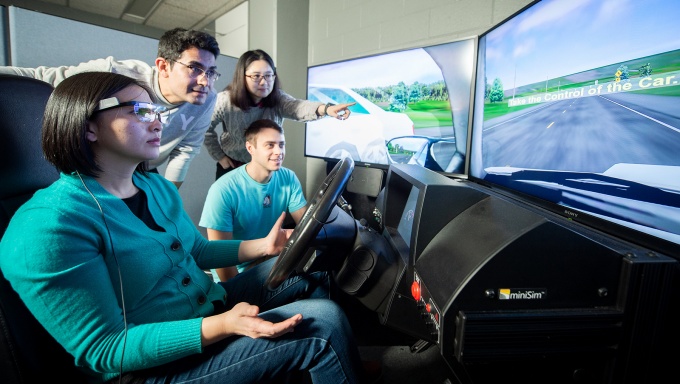Transportation and Logistics
Transportation and logistics research in ISE focuses on routing and delivery scheduling, transportation safety, intelligent transportation systems, modeling of pricing policies for traffic networks, and manufacturing logistics.

Sponsors have included agencies such as the National Science Foundation and the U.S. Department of Transportation, National Institute for Disability and Rehabilitation Research. Other sponsors have included the CUBRC Center for Transportation Injury Research, Federal Express, and Praxair Incorporated.
Affiliated Faculty
Selected Research Topics
Applied Routing and Scheduling
Research in this area includes optimizing routing costs in shipping and airline industries via efficient scheduling approaches and transportation network loading.
Transportation Safety
Research has including the use of quantitative modeling to minimize exposure to citizens during the routing of hazardous materials and use of experimental and computational studies that study driver behavior and neurological responses during driving and the improvement of public transit accessibility.
Intelligent Transportation System Design
This research includes experimental and computational modeling approaches to build intelligent transportation systems which adaptively work with human driver to prevent road accidents and improve transportation efficiency.
Road Pricing in Traffic Networks
This research has focused on control policies for vehicular networks to reduce congestion, generate revenue, reduce risk, and increase sustainability. To achieve social welfare in using the vehicular infrastructure, the effects of static, dynamic and/or stochastic road pricing on travelers’ behavior are investigated.
Manufacturing and Distribution Logistics
Manufacturing research explores strategic facility location, capacity planning (sizing), and production allocation problems, in which the use of fixed and mobile manufacturing facilities are considered simultaneously. Distribution research has explored integrated distribution center selection and space requirement problems on a two-stage network where products are shipped from plants to distribution centers, and then delivered to retailers to minimize total inbound and outbound transportation costs and total distribution center construction costs.
Big Data and Transportation Analytics
This research uses data analytics to improve transportations systems. It includes research in which conventional loop-detector data including the traffic flow and occupancy, as well as the social media data are used to mine useful knowledge of highway traffic operations and in turn provide insights in alleviating traffic congestions, detecting traffic accidents, and extracting travel patterns.
Transportation Control with Connected and Automated Vehicles
This research establishes a theoretical framework for control and management of a large-scale heterogeneous transportation network, addressing three types of heterogeneities, including automation heterogeneity (e.g., human-driven vehicles and connected and automated vehicles), traffic mode heterogeneity (e.g., emergency vehicles, transit buses, subway, pedestrians, bicycles, cars, etc.), and area heterogeneity (e.g., central business district, residential area, trucking area, etc.).
Order Fulfillment with Social Commerce
This research models order fulfillment with local stores by allowing customers’ online orders to be delivered by a network of “Social Transportation”, which consists of friends’ daily travel routines (trip chains). The proposed project will serve as a theoretic foundation to leverage social networks to improve online order fulfillment with same day delivery from local stores.